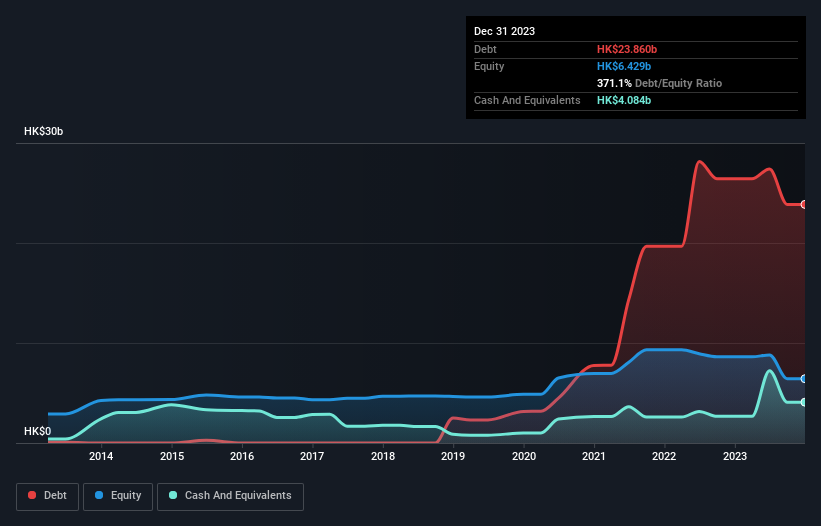Warren Buffett famously said, 'Volatility is far from synonymous with risk.' So it seems the smart money knows that debt - which is usually involved in bankruptcies - is a very important factor, when you assess how risky a company is. We note that Guangdong Land Holdings Limited (HKG:124) does have debt on its balance sheet. But is this debt a concern to shareholders?
Why Does Debt Bring Risk?
Debt and other liabilities become risky for a business when it cannot easily fulfill those obligations, either with free cash flow or by raising capital at an attractive price. In the worst case scenario, a company can go bankrupt if it cannot pay its creditors. However, a more usual (but still expensive) situation is where a company must dilute shareholders at a cheap share price simply to get debt under control. Having said that, the most common situation is where a company manages its debt reasonably well - and to its own advantage. When we examine debt levels, we first consider both cash and debt levels, together.
Check out our latest analysis for Guangdong Land Holdings
What Is Guangdong Land Holdings's Debt?
You can click the graphic below for the historical numbers, but it shows that Guangdong Land Holdings had HK$23.9b of debt in December 2023, down from HK$26.4b, one year before. However, because it has a cash reserve of HK$4.08b, its net debt is less, at about HK$19.8b.

How Strong Is Guangdong Land Holdings' Balance Sheet?
The latest balance sheet data shows that Guangdong Land Holdings had liabilities of HK$30.3b due within a year, and liabilities of HK$12.2b falling due after that. Offsetting this, it had HK$4.08b in cash and HK$547.1m in receivables that were due within 12 months. So it has liabilities totalling HK$37.9b more than its cash and near-term receivables, combined.
This deficit casts a shadow over the HK$624.7m company, like a colossus towering over mere mortals. So we'd watch its balance sheet closely, without a doubt. After all, Guangdong Land Holdings would likely require a major re-capitalisation if it had to pay its creditors today. The balance sheet is clearly the area to focus on when you are analysing debt. But it is Guangdong Land Holdings's earnings that will influence how the balance sheet holds up in the future. So when considering debt, it's definitely worth looking at the earnings trend. Click here for an interactive snapshot.
In the last year Guangdong Land Holdings wasn't profitable at an EBIT level, but managed to grow its revenue by 181%, to HK$3.9b. So its pretty obvious shareholders are hoping for more growth!
Caveat Emptor
Despite the top line growth, Guangdong Land Holdings still had an earnings before interest and tax (EBIT) loss over the last year. Its EBIT loss was a whopping HK$2.5b. When you combine this with the very significant balance sheet liabilities mentioned above, we are so wary of it that we are basically at a loss for the right words. Sure, the company might have a nice story about how they are going on to a brighter future. But the reality is that it is low on liquid assets relative to liabilities, and it lost HK$2.4b in the last year. So we think buying this stock is risky. When analysing debt levels, the balance sheet is the obvious place to start. But ultimately, every company can contain risks that exist outside of the balance sheet. Case in point: We've spotted 4 warning signs for Guangdong Land Holdings you should be aware of, and 2 of them make us uncomfortable.
Of course, if you're the type of investor who prefers buying stocks without the burden of debt, then don't hesitate to discover our exclusive list of net cash growth stocks, today.
New: Manage All Your Stock Portfolios in One Place
We've created the ultimate portfolio companion for stock investors, and it's free.
• Connect an unlimited number of Portfolios and see your total in one currency
• Be alerted to new Warning Signs or Risks via email or mobile
• Track the Fair Value of your stocks
Have feedback on this article? Concerned about the content? Get in touch with us directly. Alternatively, email editorial-team (at) simplywallst.com.
This article by Simply Wall St is general in nature. We provide commentary based on historical data and analyst forecasts only using an unbiased methodology and our articles are not intended to be financial advice. It does not constitute a recommendation to buy or sell any stock, and does not take account of your objectives, or your financial situation. We aim to bring you long-term focused analysis driven by fundamental data. Note that our analysis may not factor in the latest price-sensitive company announcements or qualitative material. Simply Wall St has no position in any stocks mentioned.
About SEHK:124
Guangdong Land Holdings
An investment holding company, invests in and develops properties in Mainland China.
Good value with low risk.
Market Insights
Community Narratives


Recently Updated Narratives


Alphabet: The Under-appreciated Compounder Hiding in Plain Sight


MINISO's fair value is projected at 26.69 with an anticipated PE ratio shift of 20x


The Quiet Giant That Became AI’s Power Grid
Popular Narratives


The company that turned a verb into a global necessity and basically runs the modern internet, digital ads, smartphones, maps, and AI.


MicroVision will explode future revenue by 380.37% with a vision towards success



